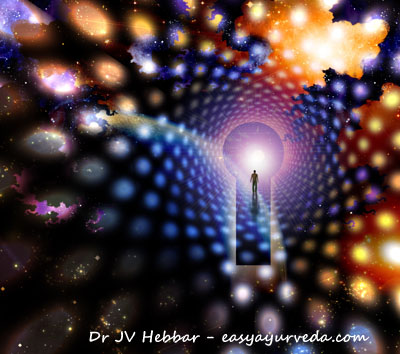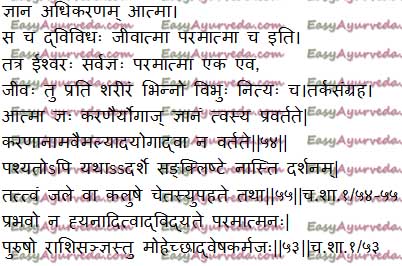Atma – The Soul: Types, Life Cycle
By Dr Raghuram Y.S. MD (Ay) & Dr Manasa, B.A.M.S
‘Atma’, in general terms is understood as ‘the soul’ which is embedded within us in the form of life element.
The presence of soul in us is an indicator of life and progression of life activities. The soul is said to be a dravya, i.e. a substance.
Read – Importance Of Soul In Perception Of Knowledge: Atma Jnana
Table of Contents
Features and types of soul
The soul is the seat of knowledge. This explains that we obtain knowledge in the presence of soul. This is achieved by the soul being in a synchronised relationship with the sense organs, mind and intellect.
Read – Incorporating Atma Jnana (Self Awareness) In Treatment – Case Study
The soul is the seat of knowledge. This explains that we obtain knowledge in the presence of soul. This is achieved by the soul being in a synchronised relationship with the sense organs, mind and intellect.
Read – Incorporating Atma Jnana (Self Awareness) In Treatment – Case Study

The soul is of two types. They are –
Jivatma – individual souls present in each body of the creation. Jivatma is independently manifested in each and every physical body which lives. Jivatma is comprised of satvadi karanas i.e. means of action like mind etc and sarva bhavas i.e. many characters / intuitions. Jivatma obtains rebirth according to the karma i.e. deeds done in previous birth and he is the one who experiences the results of good and bad deeds. Therefore the individual soul is also called as Phala Bhokta, the one who experiences the results and consequences.
Read – Foods That Increase Sattva, Rajas, Tamas: Srimad Bhagavat Geeta
Paramatma – The greater soul to which all the individual souls are related to. Paramatma is synonymous with Ishwara i.e. God. Therefore Atma is also said to be a supernatural being or God. The greater soul is said to be sarvajna i.e. ‘all knowing’ and ‘eka’ i.e. only one. The greater soul is also known by the names Parabrahma or Sarva Bhava Rahita Parama Purusha.
The greater soul is the origin of all individual souls – We all as living beings have Jivatmas in us. All these Jivatmas are governed by one Paramatma. Just like a tree branches out and a river cuts into many rivulets, all our individual souls branch out from the greater soul. Therefore all life has a common origin.
Read – 3 Basic Desires Of Life – Charaka Samhita Sutrasthana 11
All individual souls unite back into greater soul – Similarly, just like the rivers join the ocean, all the Jivatmas eventually reunite with the Paramatma after one’s death.
Fate of Death
Death has two fates.
Salvation – If one has lived a righteous life and has fulfilled all the three pursuits of life i.e. Dharma – the righteous living, Artha – ethical earning and Kama – meaningful desires, he or she will be liberated from vicious cycle of life and death and eventually obtain Moksha i.e. salvation / freedom from birth-death-rebirth cycle.
Read – 40 Ways To Attain Salvation As Per Ayurveda – Nivrutti
Re-birth – This is a point where in his soul gets united with the greater soul. If he has lived otherwise, his soul will be put into the cycle of rebirth and the soul attains rebirth in a different body. In this instance, the individual soul doesn’t get united with the greater soul.
Types of Atma – Ayurveda
Ayurveda accepts three types of Atma. In other words, In Ayurveda, the word atma gives three types of meanings. They are –
- Parama Atma – the greater soul
- Ativahiki or Sukshma Sharira yukta Atma – the soul which has a replica of the body in a subtle form
- Sthula Chetana Sharira or Karma Purusha – the soul embedded in the physical body, Jivatma, the body which is subjected to the treatment
Read – Treatment For Excess Desires – Naishtiki Chikitsa

Soul and manifestation of knowledge
Atma is known as ‘jna’ i.e. ‘the knowledgeable one’ or ‘one who has and experiences knowledge’.
The soul experiences knowledge only when he is connected with the karanas i.e. tools of knowledge i.e. mind and senses. If the soul is not connected with these tools, he cannot experience the knowledge. The soul is not involved in the production of knowledge. He is just a spectator, an audience, to whom the knowledge gained by sense organs, differentiated and understood by mind and filtered by the intellect reaches. The soul doesn’t experience the knowledge when he is dissociated with the tools of knowledge or when the tools of knowledge are contaminated. Example, just like we do not see our image in a dirty mirror or contaminated water, similarly when the mind is contaminated or diverted, not in contact with the soul, the soul doesn’t experience the knowledge.
Read – 16 Factors To Watch For A Healthy Mind And Body
Sequence in which the knowledge is obtained
To obtain the knowledge there should be synchronised linear relationship between the sense objects, sense organs, mind, intellect and soul.
First the sense organs come in contact with the sense objects. The information or knowledge of the sense objects is passed on from the sense organs to the mind. The mind understands the objects and passes on the knowledge / information to the intellect. The intellect discriminates the knowledge and decides if it is useful or not and then passes it on to the soul. The soul receives the knowledge and experiences it. If any of these tools are diseased or deviated from the equation, the knowledge or information is not transferred to the soul.
Read – Ways To Improve Knowledge, Intelligence As Per Sushruta
Origin of Aatma
Paramatma i.e. greater soul is said to be anadi i.e. that which doesn’t have a origin. Therefore obviously it doesn’t have any causative factors which make it. On the other hand, the Rashi Purusha, which is also known as Jivatma or individual soul has its origin from ignorance, desires, hatred and deeds and thus has causes for its manifestation.
Atma is devoid of qualities i.e. nirguna
The soul is devoid of any qualities. But the prakriti i.e. the nature from which the entities making up a human body and the entire combination of factors is made up of three principle qualities, i.e. sattva, raja and tama, the soul though not made up of these three qualities seem to be composed of these three qualities due to its association with the main nature.
Read – Manasika Doshas – Satva, Rajas, Tamas As Per Ayurveda
Qualities and signs of presence of the soul
Master Charaka has mentioned the signs and qualities of the soul elaborately. The main qualities and signs are – breathing phenomenon, blinking of eyes, life activities, mind activities, association of mind with various senses, retention, diversion of mind, death, desire, hatred, happiness, grief, courage, intellect, memory and egoism.
Read – Adhyatmika Gunas – Qualities Related To Soul As Per Ayurveda
Paramatma
Ishwara / Paramatma / Parabrahma – the God resides in us in the form of Jivatma
In Bhagawadgita Lord Krishna tells that he, in the form of atma (jivatma here), resides in the heart and mind of all life in the creation. If we consider Lord Krishna as God or greater soul, the individual souls which we all have are said to be representatives of this greater soul or God.
Read – If Disease Is Due To Bad Karma, Should We Fight It Or Not?
Soul is a spectator and activator
The soul stays completely detached from the body and observes everything, just like a silent spectator. Therefore it is called as a Saakshi i.e. a spectator. The body is devoid of life but it does all the actions and presents all life activities only after getting activated by the soul. Therefore the soul is called as Chetayita i.e. the motivator or activator of life activities.
Click to Consult Dr Raghuram Y.S. MD (Ayu) – Email / Skype









